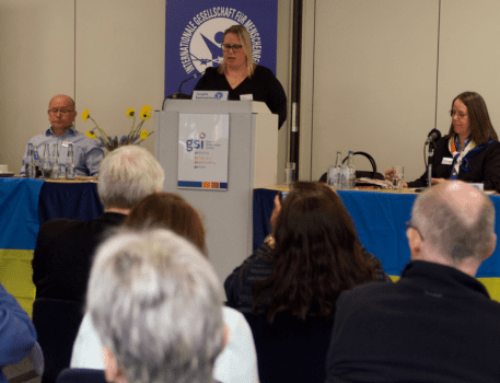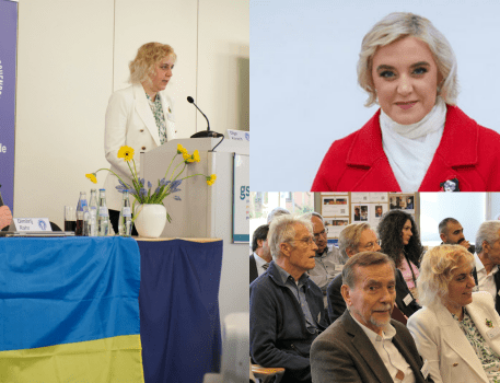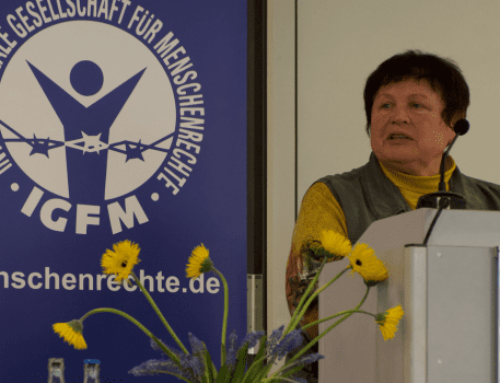Impressive Eastern Europe conference on disinformation in Frankfurt a.M.
Facebook, Twitter, Instagram
Increasing means of disinformation and manipulation in Eastern Europe
“Media, opinion making, human rights in the countries of the Eastern Partnership and Russia”, the one-year project, ended on 6-7 December 2019 with a conference in Frankfurt am Main where the headquarter of the International Society for Human Rights/ISHR is located. The representatives of the participating countries Armenia, Azerbaijan, Belarus, Georgia, Moldova, Ukraine and Russia came to the conclusion that social networks are playing an increasingly important role in the acquisition of information, thereby replacing the print media and used more than ever by governments as well as for the manipulation of opinions and targeted disinformation. In countries where the media are in the hands of governments or oligarchs, they pose an immediate threat to freedom of expression, democracy and the rule of law.
The sections of the International Society for Human Rights from the countries of the Eastern Partnership (Armenia, Azerbaijan, Belarus, Georgia, Moldova, Ukraine) and Russia/EaPR unanimously decided last autumn to address the issue of disinformation in the media. This is a topical issue that holds a particular importance for power-political steering mechanisms in their countries.

Invitation to the event in Belarus
The smartphone has long determined the street scene in Eastern Europe, and some large cities are bursting with Internet modernity and can withstand comparisons with Western IT standards at any time. At first glance, this seems to be a contrast between modern freedom and old borders. However, the coverage of numerous political affairs makes it clear to everyone that the Internet is not only a medium of global freedom, but also a specialized means to influence masses of people. Fake news is not an invention of Western media, but rather in the countries of the Eastern Partnership and Russia’s everyday IT life, to which their citizens are exposed on a daily basis.
For the past four years, the sections of the International Society for Human Rights in these countries have been concerned about the use of the Internet and the possibilities of exchanging information on the human rights situation in their countries. They were able to hold three information events on the subject in each country. The resulting summaries were presented in a joint working weekend in Frankfurt am Main.
Despite the controversial topic and the lectures given by first-class experts of the Eastern European media scene, the conference remained largely unnoticed by the German media, which in addition substantiates the conviction in Western Europe that the interest in Eastern European politics is steadily diminishing and relies rather on sanctions if something went wrong instead of using the chances to exert political influence. Nevertheless, all the guests showed serious interest despite the very specific contents of presentations that were quite challenging.

14 representatives from all countries of the Eastern Partnership/EaP and Russia at the conference table with Frankfurt politicians, as well as RWB, rferl, PRIF and of course ISHR
Besides the 14 human rights activists from Armenia, Azerbaijan, Belarus, Georgia, Moldova, Ukraine and Russia, 11 other participants sat at the conference table, who in concert can best be described as a human rights lawyer well-known in Russia and chairman of the local ISHR section, stated in the opening of his lecture: “I am happy to move in a circle of like-minded people!” The statement is applicable to each of the participants who are committed to human rights, democracy and the rule of law in their countries and who are risking their freedom and more.

right: Martina Feldmayer, MdL, the GREENS; left: Prof. Matthias Zimmer, MdB, CDU, member of the Committee on Human Rights
Martina Feldmayer, a member of the Greens’ Hessen state parliament, welcomed each individual personally before the start of the conference. The Frankfurt member of the Bundestag and representative of the Human Rights Committee, Prof. Matthias Zimmer of the CDU/CSU took the time to attend the conference despite an important private appointment. Vera Rogova from the Peace Research Institute Frankfurt/PRIF, a representative from the Eastern Europe Research Department, was very much welcomed and we hope that synergies could be established through the interface between research and NGO work.

right: Vera Rogova, Eastern European scientist of the Peace Research Institute Frankfurt/PRIF
The president of the ISHR, Prof. Dr. Thomas Schirrmacher, once again described the civil courage of the EaPR human rights activists in another way: “With a German passport, we can easily talk about human rights all over the world”. Hardly any other passport is better in this respect, the German Foreign Office does not leave one alone in the case of a problem, reacts quickly and professionally, based on his personal experiences.

from left to right: Karl Hafen, formerly 1st chairman and managing director of the ISHR, German section e.V., Prof. Dr. mult. Thomas Schirrmacher, President of ISHR international, Dr. phil. Carmen Krusch-Grün, Eastern Europe Department ISHR, German Section, Dimitrij Rahr, Interpreter, Dr. Saadat Benanyarly, 1st Chairman, ISHR-Azerbaijan, Vice-President of the International Council, – in her speech
Karl Hafen, who is a former managing director of the ISHR and co-founder of the sections Russia and Ukraine and an election observer in countries of the Eastern Partnership, briefly outlined the close and decades-long connection of the ISHR to today’s EaP/R countries and presented an original article from the Frankfurter Allgemeine Zeitung of 7 October 1987, which read in large letters: “ISHR working group founded in Moscow”.

Original article from the Frankfurter Allgemeine Zeitung of 7 October 1987, which read in large letters: “ISHR working group founded in Moscow”.
Historical similarities also emerged with Radio Liberty/Radio Free Europe, where the father of the conference interpreter, the Russian exile journalist and co-founder of the ISHR, worked from 1974-1995. The thoroughbred journalist of the American media giant, Rikard Joswiak, who specialises in reporting on the EU in Brussels and the countries of the Eastern Partnership, showed in his guest article with his vivid description of the activities of the European East StratCom Task Force in Brussels, a special unit for tracking down Russian-language fake news, troll attacks and disinformation activities.

right: Rikard Joswiak, Radio Free Europe, Radio Liberty / rferl, Prague / Brussels, center: Dimitrij Rahr, interpreter, son of ISHR co-founder Gleb Rahr
Guest speaker Jens-Uwe Thomas from Reporters Without Borders/RWB brought the freshly printed new RWB report “Taking control? Internet censorship and surveillance in Russia” from the German capital with him. The report documents how reporting and commitment to the truth inherently involve taking a personal risk and presents imprisoned journalists and bloggers. The RWB representative classified Russia and Azerbaijan as countries with a particularly high risk within the EaP/R area.

right: Jens-Uwe Thomas, Reporters Without Borders / RWB, Berlin
All conference contributions were recorded in full length by audio recording and can be made available to interested parties.
First joint results of the project can already be recorded here:
Typical for the countries of the Eastern Partnership and Russia/ EaP/R:
The concentration of the media under state and/or oligarchic structures
State structures in the media world can influence many areas of society in autocratic, repressive state structures. For instance, they can permanently influence citizens’ opinions in a targeted manner by controlling and prosecuting private media and even small bloggers, and weakening civil society through a policy of fear.
In Russia today, for example, there is an enormous, confusing number of restrictions that lead to repressive policies; the last example is the tightening of the paragraph on foreign agents, whereby private individuals who are only accused of contact with such accused persons can be sentenced to up to three years in prison. For example, § 288 of the Criminal Code-Russia about the activity as an extremist: Originally created only for the contact with terrorists, it does not delimit the terrorism, so that this law can be applied against unpopular organizations as well.
Furthermore, less concentrated concentration of power can stand against pluralism and media diversity. Armenia, for example, states: “We basically enjoy absolute freedom of expression after the Velvet Revolution, but our journalists are simply dependent on their employers, and these are oligarchs of the old authoritarian regime”.
The historically weak role of civil society in the former Soviet countries is not prepared for this modern strategy game. The members of the ISHR Belarus Section reports that within this project they were the first in their country to make disinformation the topic of discussion in the media. Strengthening civil society holds a high priority because only a strong civil society can counteract disinformation.
Due to the deficient pluralistic media landscape, the importance of social networks in these countries is increasing. Azerbaijan stated: “Social networks have become the most important source of information, and they are also used as a source by the media and the press”. But in this “open and closed” media world, it is hardly possible to verify what information or disinformation is.
All representatives of the EaP/R countries thanked the ISHR section Germany and the German Foreign Office for the promotion of this project. Through this annual project, they were able to successfully engage the local audience with disinformation and their works on this topic. On the one hand, the EaP/R countries have already become part of the ultramodern, fascinating, free world of the World Wide Web. On the other hand, they are still under the shadow of the Iron Curtain.
Together, they found out that this project and its three information events about disinformation in the media in their respective countries were significant and that it will continue to be an important issue even after the completion of the project. On the contrary, this work should definitely be continued and expanded. Especially in their countries, there is an immense need for discussion and information on the topic. Since the problems in the EaP/R countries share many similarities, and their works on human rights often involve serious personal risks, cooperation and solidarity are crucial.
Solidarity is not only needed among the EaP/R countries but also internationally!
#CivilSocietyCooperation









Leave A Comment